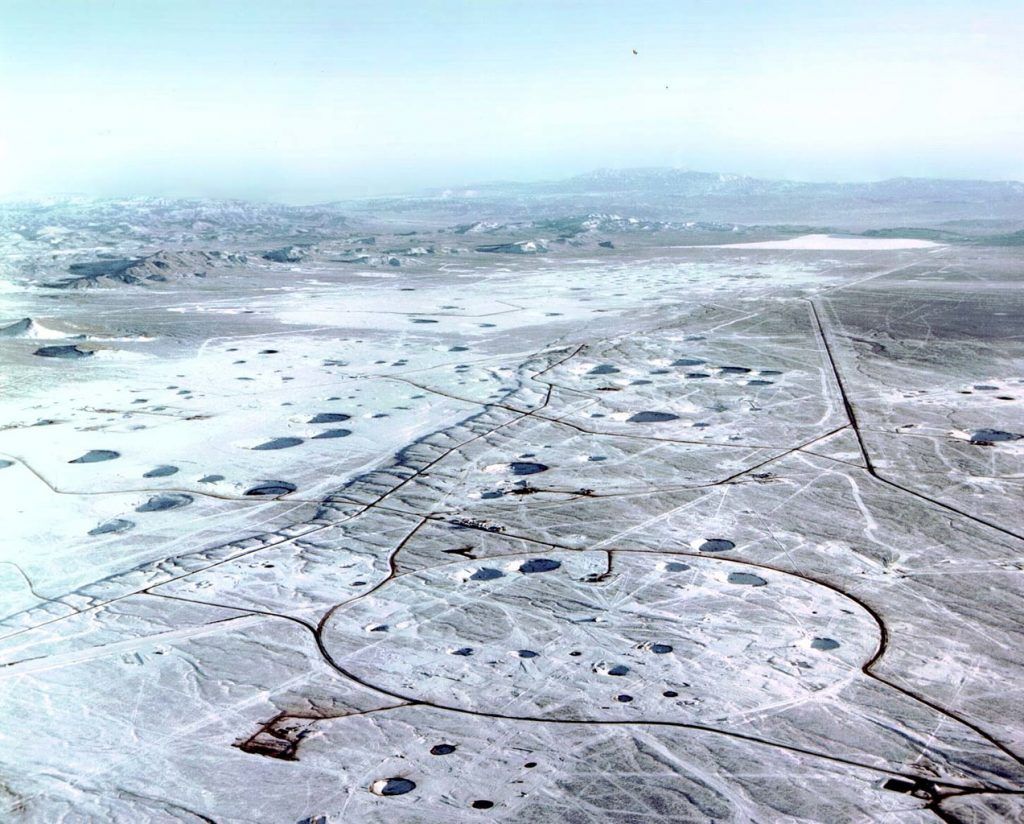Why a US nuclear test in Nevada would be bad for the world—and Trump’s reelection
By John Krzyzaniak | June 1, 2020
 Craters in the desert at the Nevada National Security Site, 2005. Image credit: Wikimedia Commons.
Craters in the desert at the Nevada National Security Site, 2005. Image credit: Wikimedia Commons.
On May 15, according to reporting in the Washington Post and the Guardian, the Trump administration held serious discussions about whether to conduct a nuclear test explosion, and those conversations are continuing.
Though the administration has not made any public remarks on the matter, many experts and policy makers have already chimed in to voice dissent. Lassina Zerbo, the head of the Comprehensive Nuclear Test Ban Treaty Organization, said a nuclear test would “pose a grave challenge to global peace and security.” Hans Kristensen, who directs the nuclear information project at the Federation of American Scientists, said it was “completely nuts.” Joe Biden, former vice president and presumptive Democratic presidential nominee, said a resumption of testing would be “as reckless as it is dangerous.”
In an interview, Robert Rosner, a distinguished professor of physics at the University of Chicago and chair of the Bulletin’s Science and Security Board, explained why there is no need for a test and why conducting one now would be so terrible—not only for US and global security, but also for President Trump himself.
Is there a need for a nuclear test? During the Cold War, the United States and the Soviet Union each conducted hundreds of nuclear explosions. But by the late-1980s, political opposition to nuclear testing was mounting, and in 1991, Mikhail Gorbachev, leader of the Soviet Union, declared a unilateral moratorium on nuclear testing. Shortly after, in 1992, the United States reciprocated. The freeze on nuclear testing created the political space for the world to begin negotiating the Comprehensive Nuclear Test Ban Treaty, which would outlaw any and all nuclear weapon test explosions.
The United States signed the treaty in 1996, but never ratified it. And the treaty still has not legally entered into force. Nevertheless, the United States has abided by the treaty’s provisions for 24 years.
But because the United States still has nuclear weapons, it needs some way to make sure they will work as designed in case they ever need to be launched. As the weapons age and various components undergo upgrades and refurbishments, the US national laboratories have been tasked with ensuring that the warheads are safe and reliable. The effort, called the Stockpile Stewardship program, involves regular surveillance and physical inspection, sophisticated computer modeling, and physical experiments.
Each year, there is an annual review of the entire stockpile that begins with the directors of the US weapons design labs, who generate an assessment of every weapon in the stockpile. At the end of the process, the US secretaries of energy and defense must sign a letter certifying to the president that there is no technical issue that would require an underground nuclear test.
For now and for the foreseeable future, there is no technical reason to test. “Do we actually need to test? The answer is—with the current weapon systems that we have—I think the answer is clearly no, we don’t need to test,” Rosner stated, adding: “I think there’s a very high consensus on that.”
Rosner said that both the Obama and the Trump administrations may have, knowingly or not, increased the risks that one day the country will need to return to nuclear testing, however. Both administrations have poured funding into surveillance and refurbishment of the nuclear stockpile, but have cut the budgets for research and development. As a result, the weapons are continuously maintained and periodically upgraded, but with ever less capacity to certify the safety and reliability of the stockpile each year.
“As long as we have nuclear weapons … we need to have a very, very strong program of R&D, of people that actually know how the weapons work. Because without those people, we’re lost. And then we are going to go right back to testing,” he said.
As the recent press reports indicate, the Trump administration is not even attempting to justify the test in terms of any technical necessity. In fact, a “rapid test” would have little to no technical value, because to get the test done quickly would require cutting many corners, including forgoing the installation of any diagnostic equipment.
Instead, the rationale appears to be nakedly political. According to the sources cited by the Washington Post, the purpose would merely be to demonstrate to Russia and China that the United States was capable of conducting such a rapid test. It may also be part of a broader effort to discredit and dismantle the Comprehensive Nuclear Test Ban Treaty.
Consequences, global and personal. Rosner, like others, is skeptical that a nuclear test would give the United States any kind of political leverage against Russia or China. On the contrary, “there is a really fantastic tactical and strategic value for the United States in maintaining a testing ban,” he said.
The biggest consequence of a test from Rosner’s perspective is that it would open the door for other countries to do the same. “If we test, it’s pretty clear others will test. Then, the crucial question is: Who are the others?”
The United States has conducted more nuclear tests than any other country in the world. The human costs of the US testing program have been devastatingly high, but the data obtained from them gave the United States a massive advantage over other countries. The weapons labs gained a vast amount of knowledge and data to improve upon nuclear weapons designs, and that data remains useful for building sophisticated computer models that can ensure the reliability of the stockpile.
“If you open up this can of worms around testing again, we lose that advantage,” Rosner noted. If other countries are allowed to conduct nuclear explosions whenever they please, it will be much easier for them to build warheads and improve their designs.
President Trump may also have a salient reason not to resume nuclear testing: the damage it could do to his 2020 reelection chances. A nuclear test would have to be carried out at the US nuclear test site in Nevada. In the 2016 election, Hillary Clinton narrowly carried that state, and Trump has shown a keen interest in flipping it in 2020. Notably, earlier this year, Trump decided to abandon Yucca Mountain as an eventual nuclear waste site, reversing course from his earlier position. This was widely seen as a move to curry favor with Nevadans, who are staunchly opposed to the Yucca Mountain project.
If Trump is worried that backlash over storing nuclear waste in Nevada would hurt his reelection odds, he may want to consider the uproar over conducting—or even planning—an underground nuclear explosion there. Utahns, too, are sure to be unhappy.
Rosner mused: “The people in Nevada fought tooth and nail against Yucca Mountain.… I can just imagine the reaction when the truck bearing the weapon is brought out to Nevada. How’s that going to look?”
Together, we make the world safer.
The Bulletin elevates expert voices above the noise. But as an independent nonprofit organization, our operations depend on the support of readers like you. Help us continue to deliver quality journalism that holds leaders accountable. Your support of our work at any level is important. In return, we promise our coverage will be understandable, influential, vigilant, solution-oriented, and fair-minded. Together we can make a difference.
















I read one report that it will take 10 years for the economy to recover from COVID19 and there is cash to test bombs? Who are we planning to have a war with ? Pandemics can bring all countries to their knees. That will make it tough to reach for that nuclear button. Shouldn’t we focus on the current existential threat instead of worring about testing our stockpile. If anything we should be worring about how to get rid of the plutonium that is inside of them. Didn’t we learn anything from the Hanford site ? …what a mess that… Read more »
MEMBERS OF CTBTO GROUP OF EMINENT PERSONS WARN AGAINST ANY DEMONSTRATION NUCLEAR TEST EXPLOSION 29 May 2020, Vienna, Austria Members of the CTBTO Group of Eminent Persons (GEM) issued the following statement in reaction to media reports that senior officials in the United States have discussed the possibility of conducting a demonstration nuclear test explosion: “We express our deep concern regarding credible press reports that senior U.S. officials have discussed the possibility of conducting a demonstration nuclear test explosion, which would, if carried out, break the global moratorium on nuclear weapon test explosions and severely undermine the Comprehensive Nuclear Test… Read more »